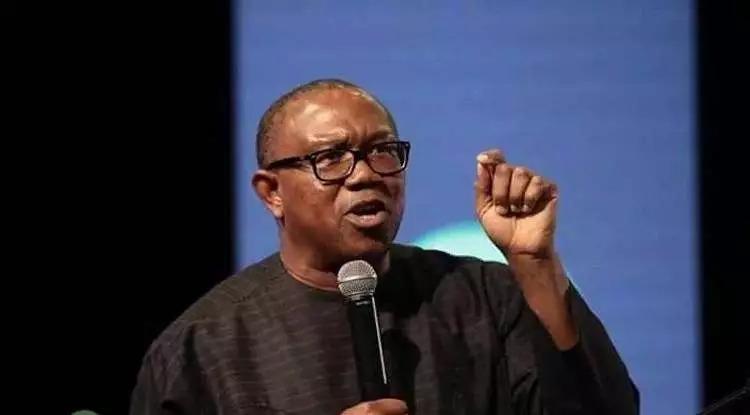The presidential candidate has enjoyed a rapid rise from outsider to election frontrunner. Is his country ready?
In Lagos there is no arguing with traffic. So when crowds backing a smiling, mild-mannered outsider for president brought gridlock to Nigeria’s teeming megacity late last year, it proved that their man had arrived as a force to be reckoned with.
Afrobeats music ringing in their ears, thousands of supporters of Peter Obi filled the streets. Many converged near the Lekki tollgate, where in 2020 soldiers had massacred people protesting against the same corruption and authoritarianism that Obi has now promised to eradicate.
“We are taking back our country,” said Chijioke Chuwunyere, a tech consultant, during the march on October 1, Nigeria’s Independence Day. “This is a chance to right all the wrongs.”
A few months earlier Obi, 61, had been an unfancied long shot to become the nominee for the main opposition party. Then he ditched the Peoples Democratic Party (PDP) and took up with the obscure Labour Party, whose previous presidential candidate secured less than 0.1 per cent of the vote in 2019.
Today, weeks away from the world’s first big election of 2023, Obi is arguably the frontrunner. Victory on February 25 would put him in charge of a booming country of 200 million people which is on track to become the planet’s second-largest democracy by 2050.
The reasons for his rapid rise include years of political and economic stagnation, his relative youth, and a suitcase.
Nigeria, everyone agrees, is sick, its long list of ailments enough to make the heart skip. Unemployment stands at 33 per cent. Annual inflation has risen to 21 per cent, with a chronic lack of foreign exchange and hundreds of millions of barrels of oil, Nigeria’s main export, lost this year to theft and inefficiency. Some 92 million Nigerians now live in acute poverty, according to the World Bank, and hundreds leave every day for greener pastures.
Life expectancy in Nigeria is 55, and 60 per cent of the population are under 25. Yet one of Obi’s main rivals, former vice-president Atiku Abubakar, is 76. The other, the former governor of Lagos State and ruling party chairman Bola Tinubu, claims to be 70, but may be far older. Obi, a successful former state governor, has cleared a very low bar to become the candidate of youth, in a country where that advantage could prove transformative.
He has also established himself as the anticorruption candidate, promising to tackle head-on what he calls the “structure of criminality” in Nigerian politics.
Inverting the country’s political culture of “big manism”, he has been photographed carrying his own luggage and proudly claims to possess only one wristwatch.
Without the backing of a major party, and despite a lack of experience in national politics, he leads in several polls, most recently one by the ANAP Foundation, a Nigerian organisation, which on December 21 found that 23 per cent of voters plan to vote for him. In second place was Tinubu, of the ruling All Progressives Congress (APC), on 13 per cent and Abubakar, of the opposition PDP was third on 10 per cent.
On January 1, Obi secured the endorsement of Olusegun Obasanjo, 85, a towering figure in Nigerian politics who was head of state in the 1970s during military rule and then president from 1999 to 2007. Obasanjo, whose preferred candidates have won three of the last four elections, noted that “the vigour, energy, agility, dynamism and outreach that the job of leadership of Nigeria requires at the very top may not be provided as a septuagenarian or older”.
Obi has two deep wells of support: young people, many of whom are cheering him on on social media, declaring themselves his #Obidients; and his own Igbo ethnic group, which largely has been shut out of politics at the highest level.
He also has broad appeal, winning over market traders, taxi drivers and high-flying businesspeople beyond those constituencies, even in the majority-Muslim north. In polite society in Lagos, professionals jaded by years of disappointment mutter approvingly of his modest habits and straight talking. One political source claimed to have been told by several staff members at the APC that they would vote for Obi.
His manifesto includes plans to refocus the military from fighting insurgencies to external threats instead. He also intends to introduce an hourly national minimum wage, support export entrepreneurs and save costs by merging government agencies. But much of it reads more like a wishlist than a programme of action. “On policy, Atiku’s is better than Obi’s and better than Tinubu’s,” said Ayisha Osori, of the Open Society Foundation, who nonetheless hopes Obi will win.
It is the style, rather than the content, of what Obi is offering that seems to resonate.
His calm delivery and affable manner set him apart in a nation used to rabble-rousing speeches. A source who attended a meeting he recently held in London said they had never seen such political excitement as in that room. Obi will be back in the capital for an event at Chatham House on January 16, a testimony to the influence of Nigerian expatriates, who do not have a vote in the election.
Obi is also helped by his opponents: he is up against two ageing political veterans shadowed by suggestions of entitlement and serious corruption accusations. Tinubu, who amassed vast wealth as the so-called “godfather of Lagos” and has said it is his “turn” to be president, is visibly unwell and recently released a video of himself on an exercise bike to prove he is fit for office. In July he settled a $42 million claim by Nigeria’s anticorruption agency over tax fraud and evasion. He also paid out $460,000 to the US in the 1990s, which accused him of laundering the proceeds of heroin trafficking.
Abubakar, who lost to the current president, Muhammadu Buhari, 80, in 2019, has denied multiple corruption allegations, including a claim by US senators that his American wife helped to transport more than $40 million “suspect funds” into the US, and a claim by Nigerian senators that in 2007 he diverted more than $100 million of public money to his own business interests.
Not that Obi’s record is squeaky clean. Financial records published in the Pandora Papers leak suggested that he owned an undeclared offshore company in the British Virgin Islands. His campaign chief, Doyin Okupe, was last month convicted of money laundering in Nigeria, having been charged in 2019 before he started working for Obi.
As a former state governor and Abubakar’s running mate in 2019, neither is Obi the total outsider he implies he is. He has been pulling the strings of his campaign from a suite in the Hilton hotel in Abuja, Nigeria’s capital.
Obi may well lose. More than half of respondents to the ANAP Foundation poll were undecided or declined to share their plans. “That’s a huge margin that shows that really the elections are still in play and nothing has been decided,” Osori said.
Both Obi’s main opponents have much larger political machines and financial resources at their disposal. Vote buying, intimidation and ballot stuffing have all been features of Nigerian elections, and while a new electronic voting system is touted as a potential solution to some fraud, a clean election is unlikely.
Whatever the result, it matters. West Africa has endured a spate of coups under the pressure of a jihadist insurgency that now encompasses much of the region. A functional election in Nigeria followed by clear signs of progress would be a shot in the arm for democracy on the continent. “Nigeria, when it performs well, is a really important anchor state for its region,” said Alex Vines, director of the Africa programme at the Chatham House think tank.
A Nigeria that remains on its current course will continue to lose talented people to the West. “For the United Kingdom the economic challenges of Nigeria have meant a steep increase of skilled migration to the UK,” he said. “There are Nigerians in all walks of life now in the UK.”
Whoever inherits the presidency will take the reins of a country that will be home to 400 million people by the middle of the century, surpassed only by India and China. For that reason, said Vines, “what happens in Nigeria is globally significant”. Osori said: “The Nigerian election should matter, espcecially in the global conversation about the future of democracy.”
The Sunday Times (London)
Discover more from The Source
Subscribe to get the latest posts sent to your email.









